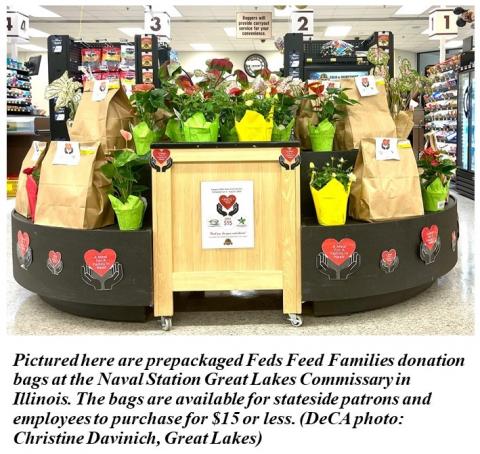FEDS FEED FAMILIES: Commissaries lead DOD’s effort to collect donations for USDA’s annual program for supporting food banks, pantries

FORT LEE, Va. – On June 3 the U.S. Department of Agriculture (USDA) kicked off its 13th annual Feds Feed Families (FFF) campaign, aimed at encouraging employees from federal departments and agencies to give in-kind contributions – food, services and time – to food banks and pantries.
This year’s campaign runs through Sept. 30, and marks the third straight year the Department of Defense has designated the Defense Commissary Agency (DeCA) to lead its effort, said Randall “Randy” Eller, the agency’s director of logistics.
“It’s an opportunity for DeCA to take the lead and expand our expertise in ‘serving the most deserving’ to the wider American public,” said Eller. “It really demonstrates the Department’s commitment to helping people in need, as well as the generosity of both commissary employees and the military patrons who shop with us.”
According to the USDA, more than 38 million people in the U.S., including 12 million children, are food insecure. The pandemic’s effect on global supply chains and food price increases have exacerbated the problem.
Since Feds Feed Families launched in 2009, the campaign has collected more than 99 million pounds of food for donation. So far this year, DeCA and its patrons have collected or contributed 1,478,609 pounds of food out of the DOD total of 1,508,674.
Commissaries on participating installations help collect those items indicated as most-needed by food pantries and then donate them to area food banks. Commissary customers and employees have a couple of options to participate:
- by purchasing needed food for donation while shopping at stateside commissaries, or bringing items from home and dropping them off at donation bins at the store
- by purchasing prepackaged donation bags available in stateside commissaries for $15 or less. The bags include Commissary Store Brand items such as Freedom’s Choice products, including canned meat, pasta meals, popcorn and water.
Once collected, installation officials work with the commissary to deliver donations to local food banks.
Some of the most-needed items include:
- Canned vegetables – low sodium or no salt preferred
- Canned fruits – in light syrup or their own juices
- Canned proteins – tuna, salmon, chicken, peanut butter and beans
- Soups – beef stew, chili, chicken, turkey or rice
- Condiments – tomato-based sauces, light soy sauce, ketchup, mustard, salad dressing or oils
- Snacks – individually packed snacks, trail mix, dried fruit, granola and cereal bars
- Multigrain cereals
- 100 percent juice – all sizes, including juice boxes
- Grains – brown and white rice, oatmeal, bulgar, quinoa, couscous, pasta, and macaroni and cheese
- Paper products and household items – paper towels, napkins and cleaning supplies
- Hygiene items – diapers, deodorants, feminine products, toilet paper, soap, toothpaste and shampoo
“The annual Feds Feed Families food drive is one of the best ways for commissaries and military families to give back to the communities which host us around the nation,” said Marine Sgt. Maj. Michael R. Saucedo, senior enlisted advisor to DeCA’s director. “Unfortunately, with the pandemic and related issues of the last few years, the need is as great as it has been in a long time. The good news is that a little goes a long way.”
For more information on this campaign, please visit the U.S. Department of Agriculture’s website.
-DeCA-
About DeCA: The Defense Commissary Agency operates a worldwide chain of commissaries providing groceries to military personnel, retirees and their families in a safe and secure shopping environment. Commissaries provide a military benefit, saving authorized patrons thousands of dollars annually on their purchases compared to similar products at commercial retailers. The discounted prices include a 5-percent surcharge, which covers the costs of building new commissaries and modernizing existing ones. A core military family support element, and a valued part of military pay and benefits, commissaries contribute to family readiness, enhance the quality of life for America’s military and their families, and help recruit and retain the best and brightest men and women to serve their country.
